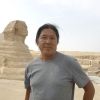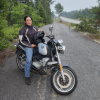CUTLINES Photo was supplied by family James Kataquapit, First World War veteran who was part of the Canadian Forestry Corp. A former Chief of Attawapiskat, he is pictured here in 1950.
Every year at this time myself and my partner Mike have to deal with the devastating losses our families have had to live with due to war. The November 11 Remembrance Day commemoration has always been a day of great sadness in remembering the veterans of the First World War and the Second World War as well as other wars. Those memories have been compounded with more sad truths through the research we have been doing over the past few years. We are working on media projects concerning the two world wars and some of our discoveries have been shocking.
So many of us have been hurt by these wars as these violent conflicts affect generations. My great-grandfather John Chookamolin and grandfather James Kataquapit were both more or less kidnapped or coerced by a recruiter from the Canadian military who travelled by canoe to the far north in 1916 to Attawapiskat. Nobody but fur traders and religious missionaries visited the James Bay coast in those days. The area was completely cut off from the rest of the world. Twenty-three young men were taken from my home community by this recruiter, with promises of money for their service to the Kitchi-Okimaw (The King) and that they would be taken care of. My grandfather John Chookomolin contracted the Spanish Flu on the voyage by ship to England and died just outside the city of London and my grandfather James Kataquapit managed to return. James’ family never received any promised money and at the end of the war, he was simply dropped off at a rail stop near Kapuskasing and told to find his way home to James Bay. John Chookomolin was never heard from again. He left behind his wife Maggie and baby daughter Louise who became my grandmother. It was a mystery regarding what happened to him until the 1980s when a family member did research and found out what happened to him.
Think for a moment of these young men who were leading quiet lives and were suddenly thrust into hard military organizations, taught to fight and then thrown into the theatre of war. Most of them found this new reality difficult and many of them lived through horrible events of violence, death and destruction. Many were physically wounded while others had to live with emotional and psychological scars known as ‘shell shock’. I think most of us in the past thought shell shock meant that a person had been shocked by a large explosion. Of course we understand now that ‘shell shock’ is what is known today as Post Traumatic Stress Disorder (PTSD), a mental health condition caused by an extremely stressful or terrifying event. Veterans from war carry with them some form of trauma and some are severely traumatized for the rest of their lives.
In our research we also discovered that addictions severely affected many first and second world war veterans. Men were often supplied amphetamines so that they would not require as much sleep or food. These drugs also gave them the strength, stamina and ability to rush headlong into battle without fear. To calm the men down after a stressful period, they were supplied with free alcohol to forget the horrors of war. The walking wounded also became acquainted with opioids like morphine to ease their physical pains. This all meant that by the end of the war, these men had to live with a combination of PTSD, symptoms of drug withdrawal, drug addiction, alcohol addiction and little help from government. Some coped better than others while others could not lead normal lives and many ended up committing suicide.
In Mike’s family, his father James McGrath and James’ brother Patrick McGrath were part of the Canadian forces in the Second World War. James was wounded in the famous Canadian led Battle of the Scheldt in Belgium and during that same battle his brother Patrick who was with him was killed. Mike never knew his dad who was one of those veterans with “shell shock”, never recovered from the trauma of war and he spent his life in and out of prison. At one point James was killed by a couple of young Ontario Provincial Police officers in a confrontation in the late 1970s.
My Mohawk family came through Patty, Mike’s sister who married into the Bradley family. I became close to the Bradley family and the patriarch John Bradley Sr. He was a veteran of the D-Day landings of June 1944 and he was involved in the most terrible battles. He survived but when he returned to Canada he was not treated with the same dignity and honour that was given to non-Native veterans. He fought against racism and bigotry to rise up and enjoy a rewarding career while raising a wonderful family.
In chatting with a friend of mine Paul Lemieux the other night, I learned that his father John F Lemieux, served in the Second World War from 1939 to 1945 as a mechanic for the Royal Canadian Air Force 406 Squadron. He had to deal with the loss of many young fighter pilot friends that did not come back from their missions. It made me realize that even those who had not seen active combat still had to deal with the horrors of war.
I pay tribute and honour to all our veterans on Remembrance Day. However the greatest remembrance for me is that war is not for the reasons we are told and our young people are used as fodder to do the bidding of the wealthy and powerful. This continues today in conflicts all over the world and predominantly right now in the Middle East and Ukraine. We owe it to the memory of veterans and the survivors of war to question every conflict and work towards peaceful solutions. The war machine is brutal and a recent example of this is the baseless efforts to discredit the journalist David Pugliese of the Post Media Ottawa Citizen who was accused by former Conservative Member of Parliament and cabinet member Chris Alexander of being a Russian spy. Journalists who question war have to deal with push back by government and media corporations. If we do not allow journalists to be critical and question conflict we are only served propaganda and that does not bode well for democracy.
I will honour the memory of our veterans by always questioning war and encouraging our governments to negotiate rather than kill and destroy.











Gold has arrived. Here in the north of Ontario we see vast streams of gold shimmering across the landscape as autumn is here and the the leaves are turning...
I am the product, evolution of many thousands of years as are you. I grew up on the land in the remote far north of Ontario following in the footsteps of my...